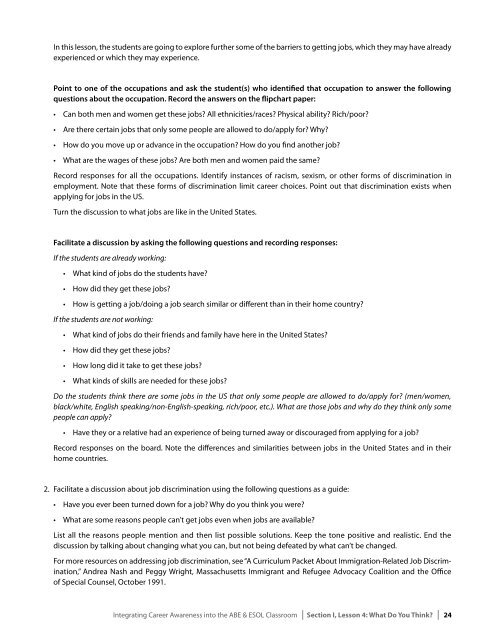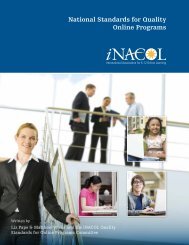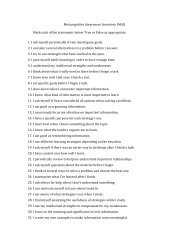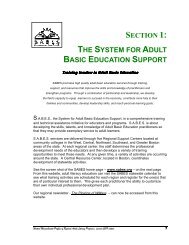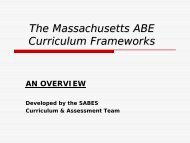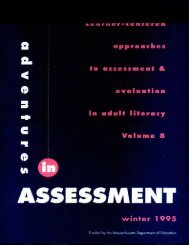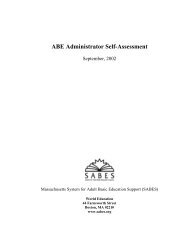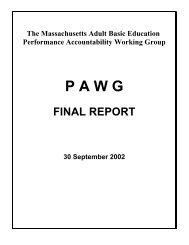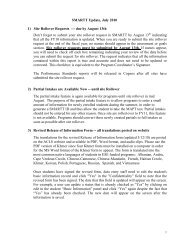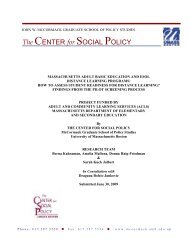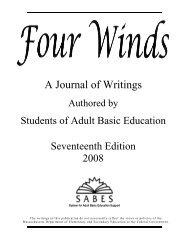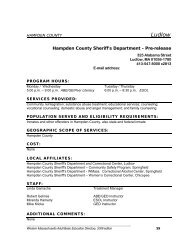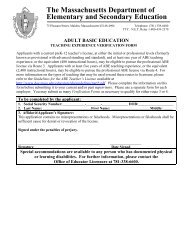Integrating Career Awareness into the ABE/ESOL Classroom - SABES
Integrating Career Awareness into the ABE/ESOL Classroom - SABES
Integrating Career Awareness into the ABE/ESOL Classroom - SABES
- No tags were found...
You also want an ePaper? Increase the reach of your titles
YUMPU automatically turns print PDFs into web optimized ePapers that Google loves.
In this lesson, <strong>the</strong> students are going to explore fur<strong>the</strong>r some of <strong>the</strong> barriers to getting jobs, which <strong>the</strong>y may have already<br />
experienced or which <strong>the</strong>y may experience.<br />
Point to one of <strong>the</strong> occupations and ask <strong>the</strong> student(s) who identified that occupation to answer <strong>the</strong> following<br />
questions about <strong>the</strong> occupation. Record <strong>the</strong> answers on <strong>the</strong> flipchart paper:<br />
• Can both men and women get <strong>the</strong>se jobs? All ethnicities/races? Physical ability? Rich/poor?<br />
• Are <strong>the</strong>re certain jobs that only some people are allowed to do/apply for? Why?<br />
• How do you move up or advance in <strong>the</strong> occupation? How do you find ano<strong>the</strong>r job?<br />
• What are <strong>the</strong> wages of <strong>the</strong>se jobs? Are both men and women paid <strong>the</strong> same?<br />
Record responses for all <strong>the</strong> occupations. Identify instances of racism, sexism, or o<strong>the</strong>r forms of discrimination in<br />
employment. Note that <strong>the</strong>se forms of discrimination limit career choices. Point out that discrimination exists when<br />
applying for jobs in <strong>the</strong> US.<br />
Turn <strong>the</strong> discussion to what jobs are like in <strong>the</strong> United States.<br />
Facilitate a discussion by asking <strong>the</strong> following questions and recording responses:<br />
If <strong>the</strong> students are already working:<br />
• What kind of jobs do <strong>the</strong> students have?<br />
• How did <strong>the</strong>y get <strong>the</strong>se jobs?<br />
• How is getting a job/doing a job search similar or different than in <strong>the</strong>ir home country?<br />
If <strong>the</strong> students are not working:<br />
• What kind of jobs do <strong>the</strong>ir friends and family have here in <strong>the</strong> United States?<br />
• How did <strong>the</strong>y get <strong>the</strong>se jobs?<br />
• How long did it take to get <strong>the</strong>se jobs?<br />
• What kinds of skills are needed for <strong>the</strong>se jobs?<br />
Do <strong>the</strong> students think <strong>the</strong>re are some jobs in <strong>the</strong> US that only some people are allowed to do/apply for? (men/women,<br />
black/white, English speaking/non-English-speaking, rich/poor, etc.). What are those jobs and why do <strong>the</strong>y think only some<br />
people can apply?<br />
• Have <strong>the</strong>y or a relative had an experience of being turned away or discouraged from applying for a job?<br />
Record responses on <strong>the</strong> board. Note <strong>the</strong> differences and similarities between jobs in <strong>the</strong> United States and in <strong>the</strong>ir<br />
home countries.<br />
2. Facilitate a discussion about job discrimination using <strong>the</strong> following questions as a guide:<br />
• Have you ever been turned down for a job? Why do you think you were?<br />
• What are some reasons people can’t get jobs even when jobs are available?<br />
List all <strong>the</strong> reasons people mention and <strong>the</strong>n list possible solutions. Keep <strong>the</strong> tone positive and realistic. End <strong>the</strong><br />
discussion by talking about changing what you can, but not being defeated by what can’t be changed.<br />
For more resources on addressing job discrimination, see “A Curriculum Packet About Immigration-Related Job Discrimination,”<br />
Andrea Nash and Peggy Wright, Massachusetts Immigrant and Refugee Advocacy Coalition and <strong>the</strong> Office<br />
of Special Counsel, October 1991.<br />
<strong>Integrating</strong> <strong>Career</strong> <strong>Awareness</strong> <strong>into</strong> <strong>the</strong> <strong>ABE</strong> & <strong>ESOL</strong> <strong>Classroom</strong> | Section I, Lesson 4: What Do You Think? | 24


